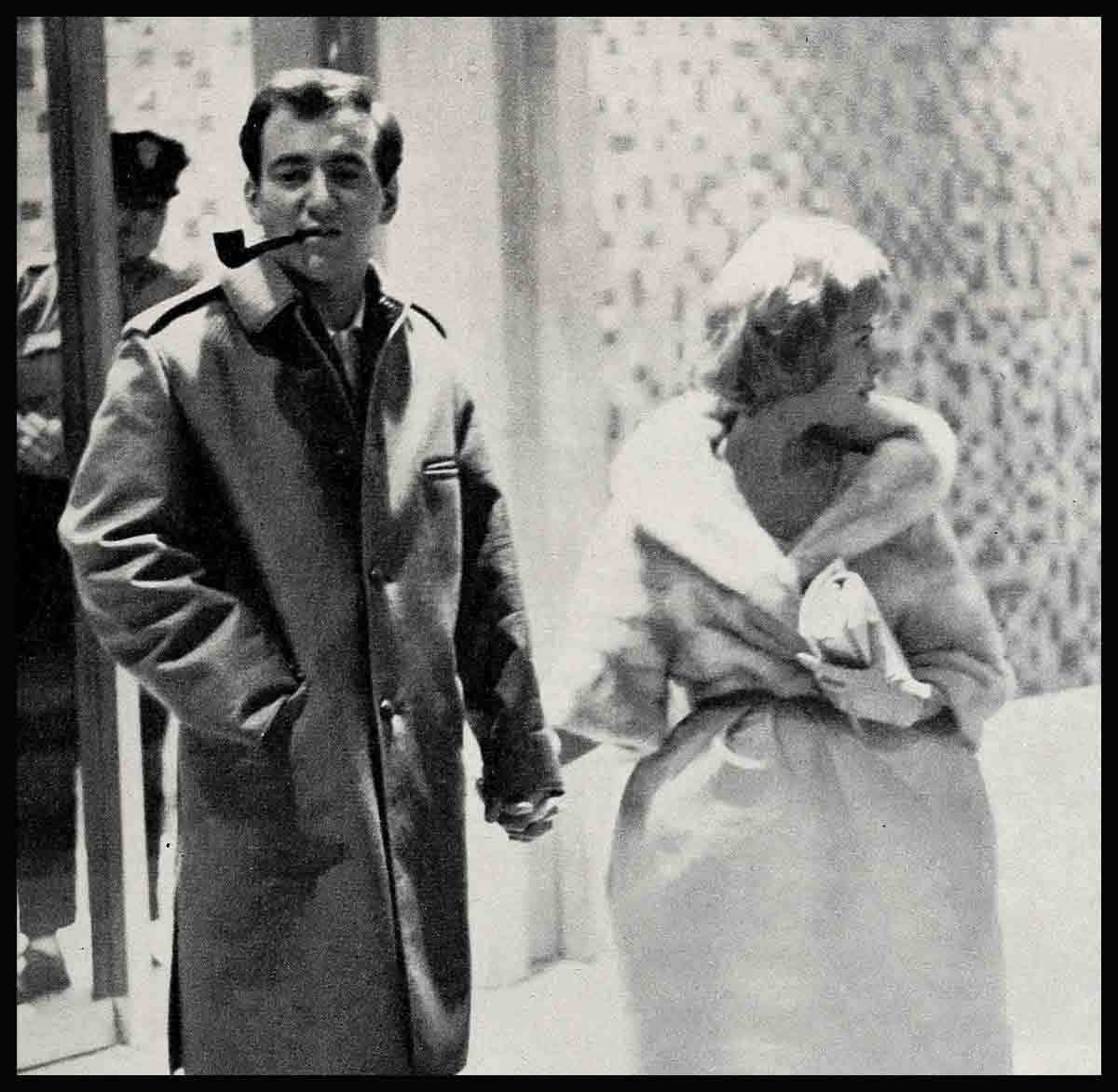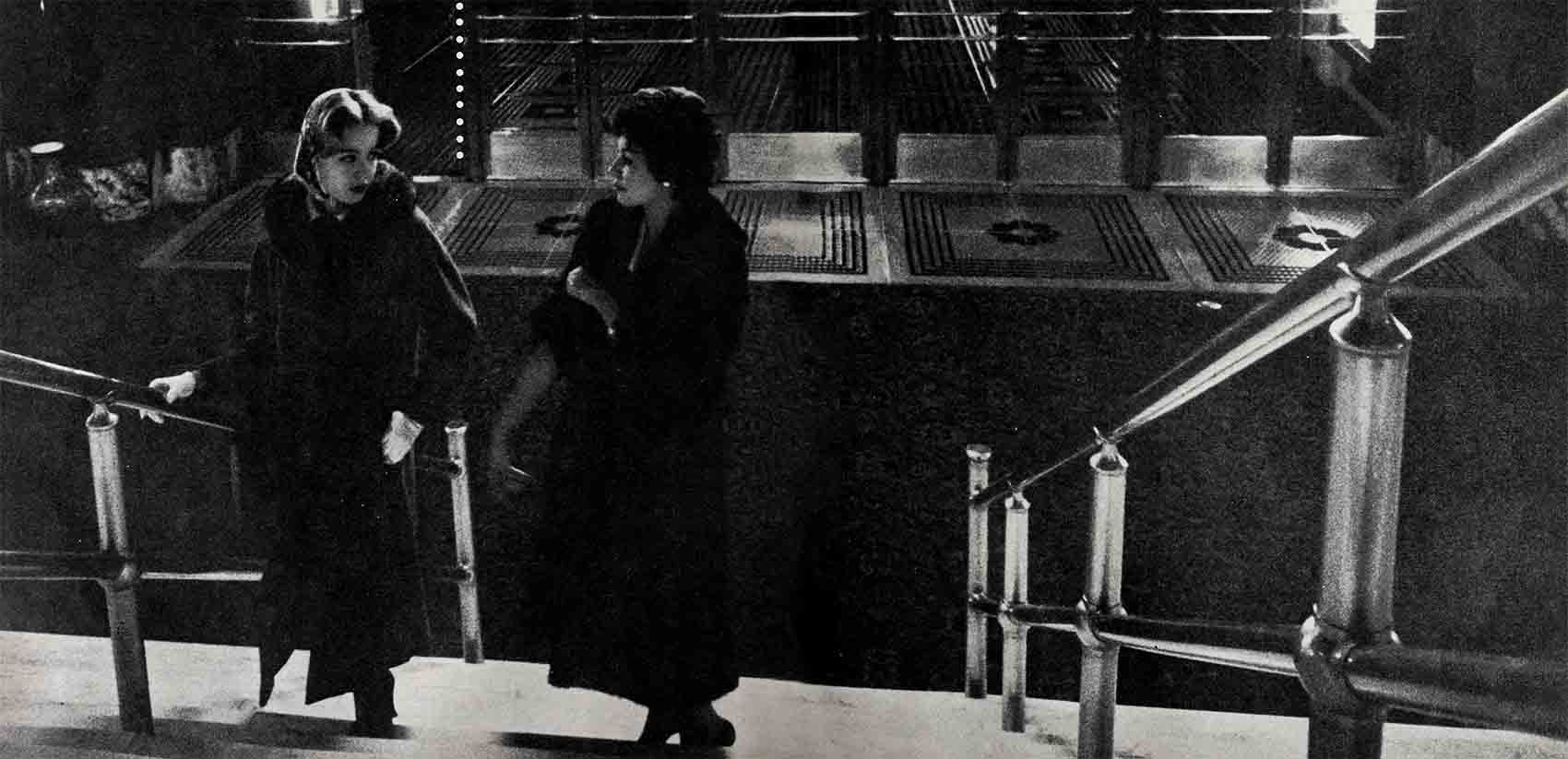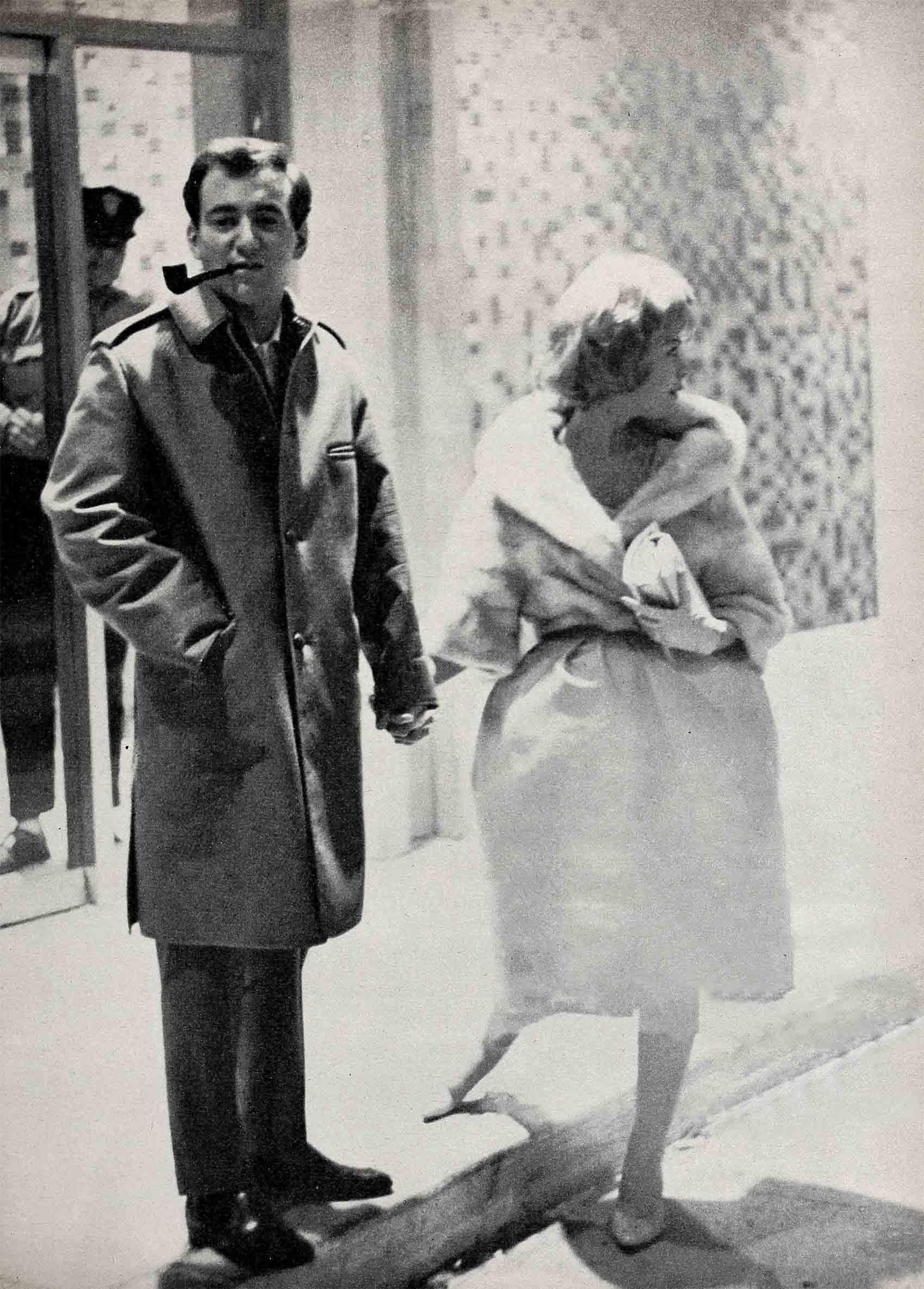
The Other Side Of The Story—Sandra Dee & Bobby Darin
To Evelyn Pain, editor, from Sara Hamilton:
I spent most of the day yesterday, Evelyn, with Mary Douvan. If there is heartache left, she is hiding it. And you know Mary well, Evelyn. She’s too open to hold anything so deep in. There is now only the wish and the hope that Sandra and Bobby may be happy and that she contribute to that happiness. There was misunderstanding, but that’s over. The day I was there Sandra called. But the irony of the whole thing is that Mary was instrumental in making it all very possible. It was Mary and her eagerness to have Sandra mingle with young people and her own sympatico for the young, being so young herself, that brought the roof down over her head. And one thing must be stressed right here. Mary always encouraged Sandra to mingle with young people, to go out on dates, to have fun. I know this first hand from my experiences with them in Rome. It was always Sandra who hung back, unlike gregarious Mary who loves everybody and loves to be on the move.
And there’s another point I must bring out to stress the workings of fate. Sandra actually fought against returning to Rome for the “Come September” picture until the last possible moment. She had spent long weeks in Italy making “Romanoff and Juliet” and all she wanted now was to stay in Beverly Hills and enjoy her new beautiful home. Only a day or two before leaving she’d telephoned me to say how she hoped for a last-minute reprieve. “I’m talking to Ross about it,” she said, meaning, of course, producer Ross Hunter who discovered her at 14 when she was a successful model in New York.
In the end, she went. (And was never to return to that house as Sandra Dee.)
Sandra . . . a new person
Once the picture started, though, Sandra became a new person. There were ten or so young people working in the film, and Sandra became friendly with them—to Mary’s delight. They would all congregate between scenes laughing and talking.
All, that is, except one character called Bobby Darin who kept strictly to himself. He’d sit off in a corner strumming his guitar and paying no mind to anyone. Finally Mary began to feel sorry for him and going over said, “Bobby, why don’t you join the young people? They seem to be having fun.” Of course, Mary, playing it all by ear, had no idea that Bobby, hack in the States, had sat through several movies, watching a lovely young blond charmer on the screen called Sandra Dee, and said to himself and others, “That’s the girl I’m going to marry.”
But he gave no indication of any marked interest in Sandy when he met her in Rome for the first time. In fact, there seemed to I be a spark of antagonism between them and Mary felt sorry about it. And sorry for Bobby Darin who seemed to be very much alone.
In the end, she asked him and his brother-in-law Charles Mafia up to the suite for a drink. And the die was cast. Bobby took to dropping in almost every day, often taking Mary and a few friends—including Sandra at times—to dinner. Sandra and Bobby were still at odds, and it seemed sometimes that Sandra resented his presence in their suite. They snapped and bickered for the three months they worked on that picture, with Mary trying to act as peacemaker.
And then it happened. Barely three weeks before the completion of the film, Sandra, in a new black frock, walked into the living room of her suite ready to go to dinner with a friend. Bobby was there.
“Have dinner with me,” he said abruptly. Sandra slowly turned and looked at him. There was that in his voice that spoke with authority, almost a command. She looked at him for a long, fascinated minute while Mary buzzed around with happiness.
“Oh, go, Sandra, go,” she pleaded. Sandra looked at her mother and the waiting friend.
“Just the two of us,” Bobby said. And while Mary fairly danced with pleasure that at last these two could be friends, Sandra walked out that door with Bobby and out of Mary’s intimate life.

Bobby’s champion
I think, and I’m surmising, that part of the hurt in Mary’s heart during the events that followed so rapidly, was due to the fact that she had so wholeheartedly liked Bobby, despite differences of opinions of others on that picture. Mary was his champion. In fact, she wrote me several times about Bobby, his wit, his appeal, his talent. “He’s an intelligent boy, too,” she wrote. “I do want you to meet him when we return.”
So contrary to what people say, Mary was beside herself with pleasure when Sandra and Bobby began seeing each other. At one time she’d tipped off Bobby that Sandra’s favorite flowers were yellow roses and every other day from then on a long box of yellow roses arrived for Sandra.
It was when Bobby turned assertive, as any lover would, that Mary began to understand what was happening. Bobby made no secret of his intentions, once he’d grabbed Sandra’s attention. “I’m going to marry your daughter so go along with it.”
It hit Mary like a ton of iron bricks. Not that any mother wouldn’t think Bobby a good catch. But marriage for Sandra at eighteen had never entered her mind.
Bobby left Rome, his role finished, a few days before Mary and Sandra. From New York he telephoned Sandra with news. “I have a gift for you.”
“Oh, what, please tell me,” she begged, but in her heart she knew it was a ring. When they arrived in New York, Mary and a friend from the studio went on to the Drake Hotel while Bobby and Sandra spent the time together before his plane took off at eleven that same evening for Hollywood.
Bobby, it seems, had business there, and, as it turned out, part of his business was renting a cozy house in Bel-Air for the bride he would bring back exactly ten days later. That’s how fast things move in the world of the brilliant young Bobby Darin. And it is undoubtedly one of the contributing factors to his enormous success today. For no one disputes the amazing, versatile talents of young Bobby Darin. And no one quarrels with the adage that all is fair in love and war. And no one can blame Bobby for setting his sights on as sweet and sheltered a beauty as Sandra Dee and winning her for his bride. I don’t. Mary doesn’t. Sandra’s fans don’t. So this is really a story with a happy ending attended only temporarily with heartache and confusion.
The heartache for a while was Mary’s. Not over the fact, I feel, that Sandra was about to become a bride. But over the rush. For always keep in mind, Sandra was Mary’s life. Her whole existence was Sandra and sure as shootin’ it was wearing them both down. For Sandra had now grown into young womanhood and was becoming restless. Mary was puzzled, and their friends were concerned for both of them. And there the situation stood when the curtain rose on Act III in Rome.

Mary was happy
Mary claims she became reconciled to Sandra’s engagement despite the fact she and Bobby had known each other well for only a matter of week’s. How could she help but be happy for Sandra whose happiness stood out like a shooting star? The brightness of it was almost blinding, and the joy of it infectious.
“You’re engaged and in love,” Mary told Sandra. “Enjoy it for a while. It’s the most wonderful period of your life.” But underneath there was a feeling of disquietude. Would they wait for Sandra’s new film “Tammy Tell Me True” to be finished? Would Sandra walk down that church aisle in flowing white as her mother pictured?
All these thoughts troubled her. For the first time in her life, I think Mary must have felt shut out from her daughter’s life. Her mind must have gone back through the years to the time Sandra was three and Mary was holding down two jobs to support them. She would take Sandra with her each day on the daytime job and each noon hour run across the street to pick up Sandra’s lunch at the restaurant. “Don’t cross the street, honey,” she’d call over to Sandy waiting at the curb. “I won’t. Mama,” Sandra would say. “I won’t cross the street.”
So now. Mary suddenly realized. Sandra had crossed the street and it was Mary who couldn’t cross hack. Sentimental, perhaps, and maybe silly, but remember, this is the way of mothers.
It was the blood test. I think, that finally brought things to a head. Sandra hadn’t mentioned that she and Bobby had undergone the steps necessary for taking out a marriage license.
Mary hadn’t been told. She. I found out, learned it through another. And in a blind panic of hurt, bewilderment, confusion and helplessness, Mary fled. She had to be alone to think things out. To know what to do and where to turn. She realized now Bobby would never wait.
For twenty-four hours she sat alone in a small motel near Philadelphia and went through her own personal agony quite alone. And when it was over. Mary had found herself and knew that nothing in this world, neither hurt, nor loneliness, nor thoughts of self, mattered in the least. What did matter was Sandra’s happiness.
She missed the wedding that took place at three o’clock in the morning in the home of one of Bobby’s friends with Bobby’s family in attendance. But that, too, was put into the past. She simply hadn’t known about it nor dreamed that in her twenty-four hours absence the wedding would take place.
The home they shared
I imagine it was murder for Mary to walk into the bright house she’d shared with Sandra in Hollywood, the two so closely knit in work and affection. But today Mary’s many friends have rallied ’round, her open-house receptions are jammed with adoring friends, her few social gatherings find her the life of the party. Her bright smile that flashes so suddenly, her wonderful hospitality, her outgoing nature enchants everyone. She’s truly a charming woman.
We talked at length about a job, Evelyn. And Mary is eager to launch herself on her own in the business world. Occasionally a word slips out about her yearnings. “Sandra was here today,” she will say, “and I watched her go down the hill in her new white car as far as I could glimpse her.”
Or she’ll say, “Sandra began her new picture, ‘Tammy Tell Me True,’ today. It’s the first time I haven’t been with her on a picture, you know.” And then her smile will flash to hide the hidden disappointment and she’ll say, “Let’s have a good cup of coffee.” And she’ll busy herself in the kitchen. And if she hears the song “Mack, the Knife” coming from the radio, she gives no sign.
A long single yellow rose in a crystal bud vase was delivered to Sandra on the day “Tammy” began. The card read, “All My Love. Mother.” Sandra read the card carefully. “I’m going to call her right now,” she said, hurrying off to the set telephone.
In fact, the day I was visiting Mary we brought the bride into our little circle by way of the telephone, with Mary and me chatting away on one end, Sandra on the other. “What are you doing?” I asked. “Cooking,” Sandra said, and we both broke out into hysterical laughter. Sandra cooking!
All Mary wants at this time, is to be allowed to come back into the warmth of being needed, of being accepted by Bobby and loved by Sandra. She’s willing now to stand off and enjoy their happiness. Mary Douvan went through a personal hell to achieve this triumph of love over self and nothing in this world will swerve her from her course. Of Bobby she speaks only the kindest words, and with glowing praise for his talents. To Sandra she gives a mother’s greatest gift: She opens her arms and lets her go.
Being a mother myself, I don’t know what else a mother can do, do you, Evelyn?
THE END
—BY SARA HAMILTON
Sandy and Bobby are in “Come September” for U-I. Sandy is also in U-I’s “Tammy Tell Me True” and “Romanoff and Juliet.” Bobby’s also in “Pepe” for Columbia.
It is a quote. PHOTOPLAY MAGAZINE APRIL 1961





zoritoler imol
3 Ağustos 2023Good write-up, I am normal visitor of one?¦s blog, maintain up the nice operate, and It’s going to be a regular visitor for a lengthy time.